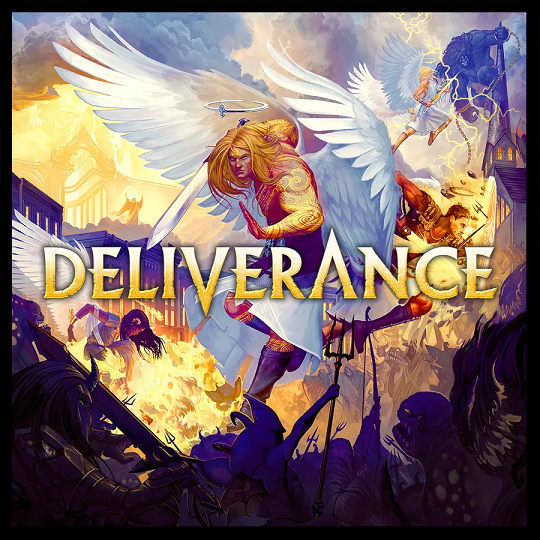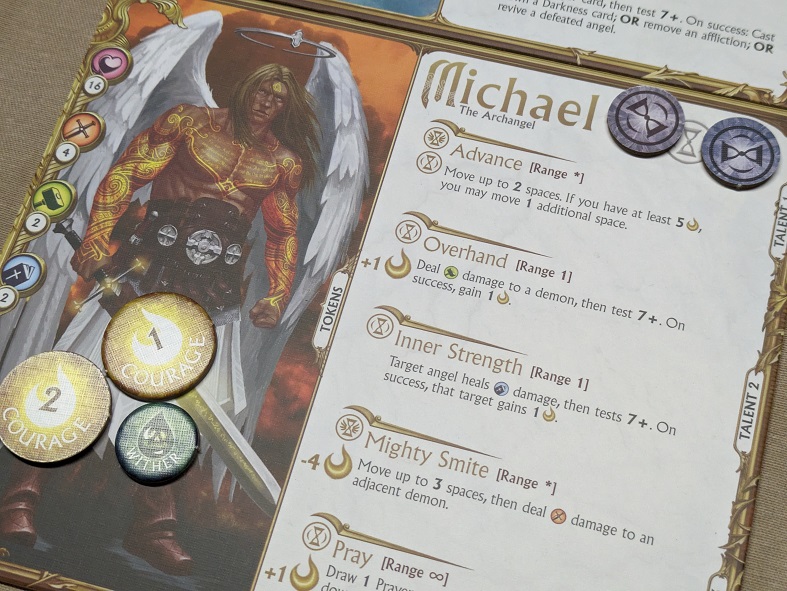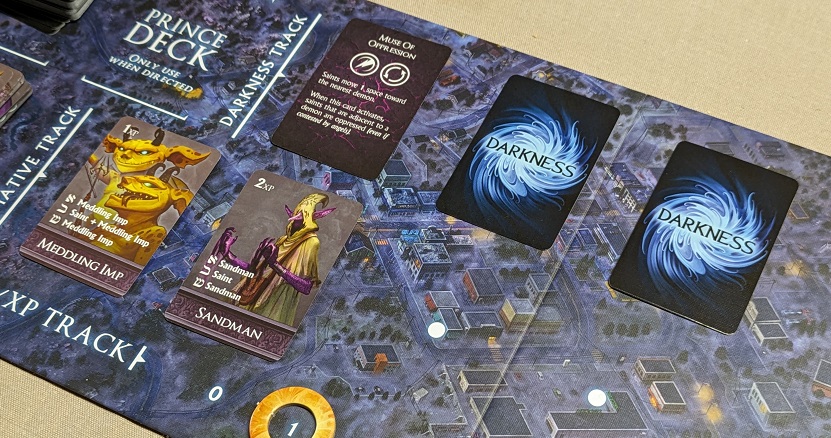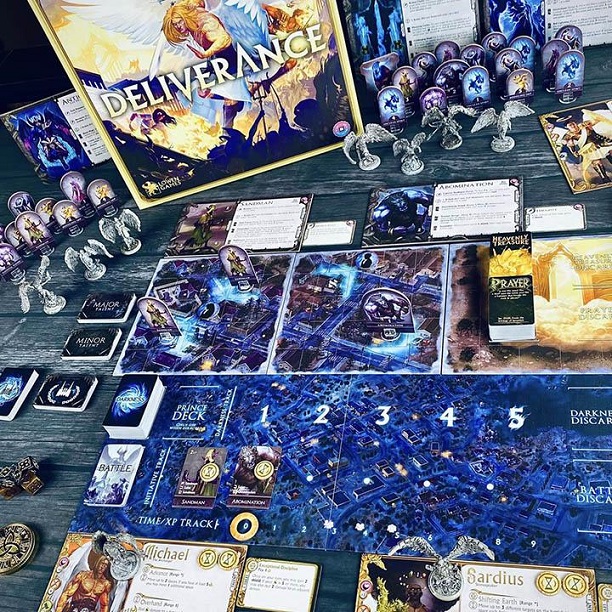
Andrew Lowen’s Deliverance is a poetic game. It begins with an equivocal foreword reflecting on the betrayal of Judas Iscariot, Christ’s crucifixion, and the utter despair at Gethsemane. It weaves that background into a parallel sense of dread focused on the modern town of Fallbrook. You arise, an angel of heaven wielding sword and faith, ready to uproot the evil that has returned.
This melodious setting is the essence of a very grounded game that looks like a traditional dungeon crawler. That’s true in the broadest of definitions, but more accurately, it’s a cooperative skirmish game. Each player fields a powerful angel with unique abilities and tactics, moving them around the tiles and fighting for optimal positioning against their adversaries. But there’s no exploration or development of the board as environment. Its format has much in common with games such as Street Masters, TMNT Adventures, and Dark Venture: Battle of the Ancients. Throughout the lengthy campaign there are occasional twists and unexpected happenings, but it consistently feels as though you are fighting in a staged area. You’re not triggering narrative paragraphs, finding hidden passages, or pursuing larger story elements. It’s a brawl, albeit one that’s stylish and mechanically interesting.
It’s really an unusual concoction. Games of this ilk are often dramatic and loose, with a few outliers. Deliverance is one such outlier, leaning towards the Gloomhaven and Perdition’s Mouth end of the spectrum. It frames scenes very much as a puzzle. You need to strategically assess the board layout and what foes you are up against, and then alter your tactical approach each round to meet the evolving situation.
Each angel only receives two actions during the round. These are spent to trigger character specific abilities with each protagonist possessing a unique playstyle. Movement tends to be deliberate and predictable. Attacks and special abilities inflict static damage amounts. There is dice rolling, but it’s used very consciously to add variance concerning secondary effects and additional bonus outcomes.

The most unpredictable portion of play is found with the AI controlled foes. Each type of demon has their own action chart. A die is thrown to determine their behavior, which establishes a much-needed element of tension that disrupts careful planning. It’s my favorite quality of the game, particularly when you start to encounter some of the more complex bosses and minions. It functions very much like a streamlined Sword & Sorcery, nicking some of the strongest details of that system without the underlying complexity.
Another accomplishment is the game’s internal method of pressure. This is achieved by a cruel entity known as the Darkness deck. These cards are dealt out at the beginning of each round. The more players participating in the game, the more are drawn. Furthermore, additional cards are suffered if you fail to liberate various saints scattered about the map. These characters of interest form focal points for action and offer an additional strategic flourish for players to consider.
What’s nifty is that these cards are functionally negative events, but they only trigger if neglected. Once the row of available slots is filled you begin flipping cards faceup and trigger a negative effect. Sometimes these are one-off devils that twist a dagger into your side, other times they’re ongoing effects that keep harassing your efforts. You can cast the darkness away with the prayer action, but giving up half of your turn to do so is costly. This adds a resource management element to play, one where the resource is interesting and can possibly cause a cascade of horror. These cards sit as dark clouds over the table, threatening doom and requiring you keep a constant eye on their formation. It’s delightful as a strategic puzzle, as well as a form of emergent narrative.

By force, hath overcome but half his foe.”
Deliverance feels extraordinarily well honed. As if a great deal of effort and care went into its design. The linear campaign consists of 14 scenarios chock-full of thorny combat situations and clever system developments. Your angels gain experience as you progress, unlocking new talents or abilities for your hero. There’s a surprising degree of latitude as you’re able to focus on one of your talent slots to progress it farther along and utilize fewer but more potent abilities; or you can devote experience to unlocking more slots and tackling the scenario with increased versatility. Each character has a personal pool of talent cards, and you can reconfigure your abilities before each session. It’s rich and full of meaningful choice.
Skirmish mode mimics Descent 2nd edition where you gain abilities over the course of a single scenario. You earn experience here for killing enemies, allowing you to spend them during play to attain new talents. It’s an enticing compression of the campaign gains with more immediate rewards at the expense of some unique unlocks and more strategic long-term play.
There’s less anticipation and surprise in terms of what you will encounter in this mode. Play is divided into two portions with the back half being a boss encounter. This works wonderfully and I could envision someone engaging this game solely in the skirmish one-off format. It does not feel tacked-on, or content fashioned solely to attract a diverse suite of potential consumers. Similarly, both formats support solitaire play rather well, either going it alone with one angel and a special Intercessor support unit, or by playing multi-handed and controlling two or more characters. This works easily enough and is very reasonable in terms of upkeep and needed attention.
A key aspect of this style of game is the difficulty. With the focus on tactical play and escalating challenges, particularly in the campaign format, this is crucial to maintaining interest. And this is another element of the game that is expertly designed. Difficulty can be adjusted, but I found it near perfect with the standard setting. It also scales well, although strategic considerations shift in interesting ways at different player counts. For instance, with a full contingent of four, you will need to spend more effort managing the darkness cards and maintaining a strong balance between prayer and combat actions. This actually feels like one of the more refined designs I’ve seen in terms of seamlessly transition between various group sizes, and it’s a quality of the game that deserves recognition.

Deliverance’s most enigmatic trait is its setting and presentation of Christian themes. There’s a stigma attached to entertainment with a religious background and that connotation certainly threatens to obfuscate the quality experience offered here. Lowen’s design is positioned in a surprisingly formidable stance as an authentic work steeped in theological imagery while also presenting a very sturdy tactical board game. It never comes across as a dogmatic product utilizing the hobby as its vehicle, rather, it feels the fullness of a game designed by someone who loves their craft and understands the medium.
This is a serious game. But it’s one that offers space allowing for a more secular engagement. In the same way that one can relate to the beauty of Madonna and the Child or fall into the world of the old Christopher Walkin film The Prophecy. Just as an atheist can glean something from the pages of Dante’s Inferno, one can likewise derive tactical contentment from the cardboard of Deliverance. The setting can even be viewed as fantastical and appreciated similarly to other conventional properties.
Its preconditions are rather malleable. I’ve personally grown up Catholic, attending 12 years of education at religious schools. I’ve spent time as an atheist and time as an agnostic. My own spiritual identity is complex and enigmatic. Delving into the world of Deliverance has pushed my thoughts in various directions, but it’s also offered much restraint and pliability.
Despite no requirement for religious identification, I wouldn’t call the game’s imagery subtle. It’s fierce with angels and demons battling over souls in the street. But I would make a claim of nuance for some of its more pointed themes.
One such motif is the angels possessing great power to vanquish the physical manifestations of evil through force. Carefully positioning your characters and efficiently harnessing your abilities to strike down the denizens of hell is the bulk of play. But the design does not shirk away from the metaphysical. You must engage in the prayer action to combat the metaphysical elements of Satan. By calling upon the power of God you overcome the most nefarious of plots and find solace. This act of conviction beats back the darkness and cures ailments.
It also flirts with themes of unity and service. There is great emphasis on protecting the weak and rehabilitating those who have turned to darkness. I’m revealing a slight spoiler here, but there’s even an arc that addresses the plight of hopelessness and suicide. At its best, it’s a tactically engaging game undergirded by heavy contemplations.

Where joy forever dwells: Hail, horrors, hail.”
This is an accomplished title. Because of its success, I find myself wishing it was just a touch more agreeable with my own desires for this style of game. As it leans so heavily into the puzzle-y side of tactical combat, it inherently is structured as a more mechanical experience. While there is some solid writing accompanying each scenario, it’s spartan and almost immediately fades from memory. There are no substantial narrative developments and the story that emerges from play is less interesting than the activity that carried you through it.
It’s important to realize there is less of a prescribed narrative than even Gloomhaven. And because play is less dynamic and swingy than its more traditional peers, the emergent narrative is subdued as well. This can foster a repetitive nature to the game, particularly when paired with the lack of a fail-forward system. If you lose a campaign mission, you just have to suck it up and try again. This is a key area I wish it would have diverged from Gloomhaven, instead forging a unique path.
Yet none of this derails the core spirit of the game. Those seeking another deliberate and rewarding tactical experience will find comfort with Deliverance. It’s a skillfully constructed skirmish and dungeon crawl hybrid that is intellectually challenging and thematically expressive.
A review copy of the game was provided by the publisher.
If you enjoy what I’m doing and want to support my efforts, please consider dropping off a tip at my Ko-Fi or supporting me on Patreon.

Love the concept and execution but I want to be the demon against the angels.
Great review as always.
LikeLiked by 1 person
Yeah, unfortunately it’s fully coop as opposed to an one versus many with a player controlling the demon side.
LikeLike
Had our first 2 player skirmish game with the Legion last night. We had some nasty darkness card combos somewhat countered by some luck with the heavenly treasures. This meant it was a case of three steps forward and two backward and, with a variety of minions gracing the table, the game lasted a long time. Rather than a dungeon crawler it felt like a boss battler to me and I have to say that I really enjoyed it. One of its strengths is the relatively light ruleset – this is no Swords and Sorcery! I think the setting is great, although some of the writing comes across as a little odd at times, at least to this seasoned gamer with an ageing degree in theology 😉
LikeLiked by 1 person
Yes, it does feel like a boss battler at times, particularly in the second half of the skirmish scenario. And yes, it’s much less complicated than Sword & Sorcery, which is a beast in its own right. Good luck in future plays!
LikeLike